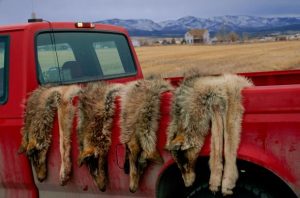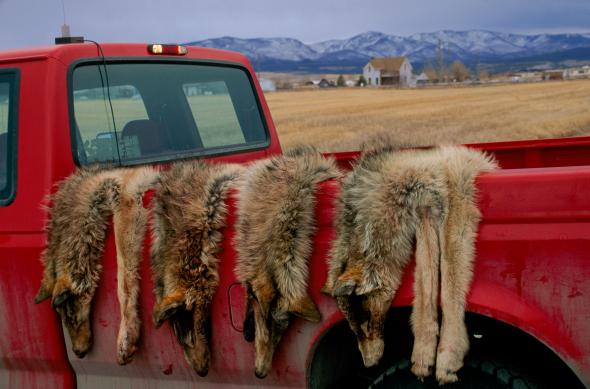
Pelts from four gray wolves shot by United States federal officials in Montana hang over a truck. A new study weakens the theory that killing predators can help protect livestock.
“We found this posted to the public on a Ferry County residents page. ” Looks like our Words are beginning to make inroads 😉
The Case for Mass Slaughter of Predators Just Got Weaker
A new study found that there’s little evidence that lethal predator control does anything to help ranchers.
Wildlife officials in Washington State recently green-lit a controversial plan to kill a pack of wolves fingered as the culprits behind a spate of attacks on cows there. The way the state sees it, taking out the carnivores could help prevent more livestock losses.
The United States used this justification to kill thousands of coyotes, wolves, bears, and other predators last year. Other nations, including Canada and Finland, have also authorized predator hunts for this reason.
But these killings might not solve any problems after all. A new studypublished Thursday in the journal Frontiers in Ecology and the Environment found that there’s little scientific evidence that killing predators actually accomplishes the goal of protecting livestock.
“We know anecdotes and perceptions don’t get us very far when we’re dealing with a problem like livestock predation,” says Adrian Treves, a conservation biologist from the University of Wisconsin who co-authored the paper. “The science of predator control has been slow and not very advanced.”
Hunting for Evidence
Treves and his colleagues reviewed previous research attempting to measure the effectiveness of various predator-control methods in North America and Europe. Some studies looked at whether killing predators meant fewer livestock deaths, while others examined the success of nonlethal deterrents, such as the use of guard dogs and flag-lined ropes or wires.
The scientists found that most of the research doesn’t hold up scientifically. Only two studies were considered robust because they took into consideration the possible effects of things like disease and other elements that could influence livestock deaths. But neither study focused on the effectiveness of killing predators. What the papers concluded instead was that certain nonlethal predator-control methods helped prevent future attacks on livestock.
Source: The Case For Mass Slaughter of Predators Just Got Weaker
